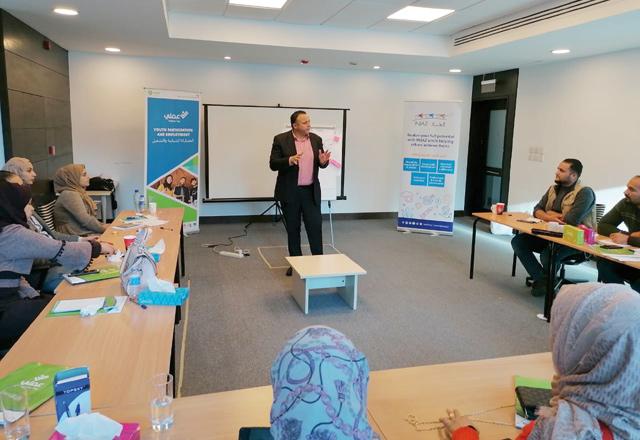- Local News
- Mon-2020-12-07 | 04:13 pm

Nayrouz News Agency :
As the COVID-19 pandemic continues wreaking havoc around the world leaving millions without jobs, pay cheques and grinding economies to a halt, a local non-profit in Jordan, INJAZ, is forging ahead capitalising on "unique opportunities” to address employment gaps in these challenging times through the Youth Participation and Employment project (YPE).
The YPE provides specialised training to young people, increasing their employability and allowing them to overcome traditional obstacles to finding work. Delivered by INJAZ, a non-profit specialising in youth skills training, the project positions young people to start their own businesses and encourages them to become "beacons of change” in their local communities, according to an INJAZ statement.
The YPE also targets employers by providing necessary skills and training to support young people and motivate recruitment by ensuring they offer requisite training, fellowship and internship programmes.
The project also creates online platforms that allow them to connect with various learning and training opportunities.
According to Executive Director INJAZ Education Muhannad Al Jarrah, approximately 5,000 participants have gone through the programme since its launch in 2018.
INJAZ’s YPE component is housed under three programmes. The first titled "Communication in the Workplace” ensures participants learn the components of effective communication in the workplace. The second titled "My Road to Employment” solidifies resume and cover letter-writing as well as interview preparation.
The third programme is titled "Work Ethics”, which focuses on fundamental principles in the workplace, shedding light on corruption and bad work habits. Additional programming also ensures that gender issues are covered, whereby stereotypical images of work roles are deconstructed, the statement said.
"Many of our programmes turned into digital throughout the coronavirus crisis,” Jarrah noted.
"While the pandemic impacted many jobs and businesses in Jordan, employment-training opportunities were not, thankfully, leaving many to simply depend on remote work throughout the crisis,” he said.
Jarrah said that the crisis helped many adjust their ways of working and begin a heavy reliance on remote-working, different from those traditionally relied on at the office. It also taught participants about flexible working hours, allowing them to work at the times they are most productive.
Participants typically go through a series of stages upon applying with the YPE programme. Following a first phase of training, participants become eligible for a second phase after being vetted by INJAZ’s employment unit. This unit works on transferring job-ready participants to the workplace by connecting them to training opportunities in the private and civil society sectors — allowing them to sharpen their professional skills through on-the-job experience while also exposing them to future employment options.
This segment of YPE’s training also includes paid fellowships through which young people looking for work are given hands-on work opportunities in civil society organisations for 10 months. Internships are also offered, in partnership with the private sector, connecting participants to training opportunities that last for three months, according to the statement.
YPE ensures that it targets vulnerable groups as well, including people with disabilities. It includes a five-month training and employment opportunity whereby participants are shadowed with a job coach for the first three, and then left to work independently for the remaining two months, the statement said.
Job coaches, who receive in-depth training before starting, not only support people with disabilities during the first three months, but also help evaluate partner companies and determine the nature of jobs that are suitable for people with disabilities, ensuring any possible challenges that could arise during the course of work are mitigated, according to the statement.
Jarrah noted that among the vetted participants, 34 benefitted from fellowships in addition to 117 from internships, including eight people with disabilities who were accompanied by eight job coaches. Interns were hosted by 45 institutions.
YPE’s activities are intentionally active in four governates in the Kingdom: Balqa, Madaba, Karak and Tafileh, notably "locations where job opportunities for young people are hard to come by and where civic participation amongst youth is extremely limited”. In order to fill this growing gap, YPE specifically targets those between the ages of 18 and 35 — both Jordanian and Syrian. It is implemented by international non-governmental organisation, Oxfam.
Rula Aburub, Oxfam’s YPE project manager, said that while initially, the initiative focused on human rights, the work shifted to addressing long-overdue employment and training needs in Jordan, Morocco, Egypt and Tunisia in July 2017.
"Oxfam essentially provides the outline of the plans and strategies for the programme, offering financial and work plan support to implementing partners, who in turn draft the more detailed plans and who are ultimately responsible for the implementation,” Aburub added, noting that Oxfam ensures that finalised plans meet "strategic fitness” requirements, meaning they’re as compatible as possible with the visions of all involved”.
"The pandemic has really shifted the way people live and work this year,” Jarrah said. "But we know one thing for sure: The need for work is on the rise more than ever. The demand for on-the-job training and the demand for linking employers with trained, competent young people eager to work also exist more than ever before. I’m proud of INJAZ for filling this gap.









